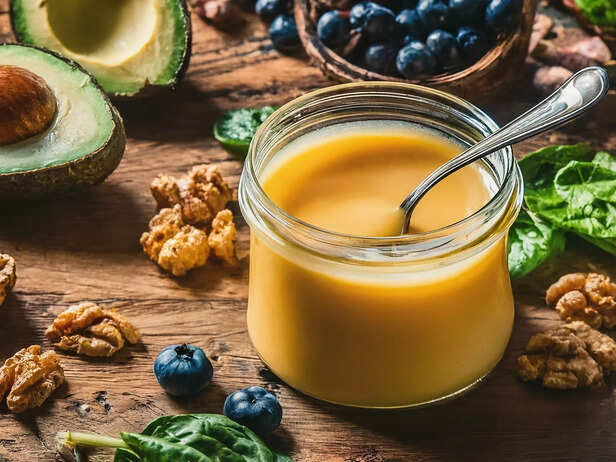A2 Ghee vs. Regular Ghee: What’s the Difference?
Nidhi | Sep 27, 2024, 18:42 IST
( Image credit : Timeslife )
Understanding the differences between A2 ghee and regular ghee is essential for making informed dietary choices. This guide delves into the health implications of both types, highlighting the benefits of A2 ghee derived from A2 cows, known for being easier to digest and potentially less inflammatory. Discover how the nutritional profiles differ and why selecting the right ghee can impact your overall health.
Who didn’t hear of Ghee, no matter if you're from North India or South India, a staple in Indian cooking that has long been celebrated for its rich flavor and numerous health benefits. But lately, a new member has emerged in the world of ghee: A2 ghee. Now you must be wondering how it differs from the regular ghee you’ve been using for years,
We get you.
Let’s explore what makes A2 ghee stand out
To understand A2 ghee, you need to understand the difference between A1 and A2 milk. Milk is rich in proteins, mainly beta-casein, which exists in two forms: A1 and A2.
A1 milk is obtained from specific cow breeds like Holstein and Friesian, which are often found in commercial dairy farming.
On the other hand, A2 milk is sourced from native breeds such as Gir and Sahiwal, known for exclusively producing milk with the A2 beta-casein protein.
A2 ghee is produced exclusively from the milk of A2 cows, resulting in a product that is purer and more easily digestible than conventional ghee, which generally consists of a mixture of A1 and A2 proteins.
Digestibility factor
A2 milk differs from A1 milk in that it does not produce the peptide beta-casomorphin-7 (BCM-7), a compound linked to inflammation, digestive issues, and symptoms resembling lactose intolerance in certain individuals.
If you've ever felt bloated or uncomfortable after consuming regular ghee or dairy products, switching to A2 ghee could offer relief. A2 ghee is ideal for those with sensitive digestion or mild lactose intolerance because it’s less likely to cause gastric issues.
Nutritional Benefits
A2 ghee and traditional ghee are both abundant in healthy fats and fat-soluble vitamins such as A, D, E, and K. However, A2 ghee offers an extra advantage. The A2 milk used in its production typically has a superior nutrient profile, with higher levels of essential nutrients and better retention of omega-3 fatty acids, which are crucial for heart health.
Additionally, A2 ghee is packed with antioxidants, which help neutralize free radicals in the body, potentially lowering the risk of chronic diseases.
Anti-inflammatory
A significant health advantage of A2 ghee is its anti-inflammatory characteristics. Although standard ghee offers certain anti-inflammatory benefits, A2 ghee is regarded as more potent due to the absence of the A1 protein, which has been linked to the initiation of inflammatory reactions within the body.
Skin and Hair Advantages
For those seeng radiant skin and robust, lustrous hair, A2 ghee may serve as a significant solution. The beneficial fats and vitamins present in A2 ghee provide nourishment to the skin internally, enhancing its elasticity and moisture levels.
Regarding hair care, A2 ghee can fortify the hair roots and hydrate the scalp, helping to prevent dandruff while encouraging healthy hair growth.
Which Option Offers More Health Benefits?
When choosing between A2 ghee and regular ghee, consider your health objectives. A2 ghee provides benefits like enhanced digestion, reduced inflammation, and a superior nutrient profile, making it particularly beneficial for those with lactose intolerance or anyone aiming to lead a healthier lifestyle.
Although A2 ghee is often more expensive due to the rarity of A2 milk, many consider it a valuable investment in long-term health. Next time you shop, think about choosing A2 ghee for its potential benefits for your body, digestion, and skin.
We get you.
Let’s explore what makes A2 ghee stand out

A2 ghee
( Image credit : Timeslife )
To understand A2 ghee, you need to understand the difference between A1 and A2 milk. Milk is rich in proteins, mainly beta-casein, which exists in two forms: A1 and A2.
A1 milk is obtained from specific cow breeds like Holstein and Friesian, which are often found in commercial dairy farming.
On the other hand, A2 milk is sourced from native breeds such as Gir and Sahiwal, known for exclusively producing milk with the A2 beta-casein protein.
A2 ghee is produced exclusively from the milk of A2 cows, resulting in a product that is purer and more easily digestible than conventional ghee, which generally consists of a mixture of A1 and A2 proteins.
Digestibility factor

Digestion
( Image credit : Timeslife )
A2 milk differs from A1 milk in that it does not produce the peptide beta-casomorphin-7 (BCM-7), a compound linked to inflammation, digestive issues, and symptoms resembling lactose intolerance in certain individuals.
If you've ever felt bloated or uncomfortable after consuming regular ghee or dairy products, switching to A2 ghee could offer relief. A2 ghee is ideal for those with sensitive digestion or mild lactose intolerance because it’s less likely to cause gastric issues.
Nutritional Benefits

Nutritional benefits
( Image credit : Timeslife )
A2 ghee and traditional ghee are both abundant in healthy fats and fat-soluble vitamins such as A, D, E, and K. However, A2 ghee offers an extra advantage. The A2 milk used in its production typically has a superior nutrient profile, with higher levels of essential nutrients and better retention of omega-3 fatty acids, which are crucial for heart health.
Additionally, A2 ghee is packed with antioxidants, which help neutralize free radicals in the body, potentially lowering the risk of chronic diseases.
Anti-inflammatory

Anti-inflammatory
( Image credit : Timeslife )
A significant health advantage of A2 ghee is its anti-inflammatory characteristics. Although standard ghee offers certain anti-inflammatory benefits, A2 ghee is regarded as more potent due to the absence of the A1 protein, which has been linked to the initiation of inflammatory reactions within the body.
Skin and Hair Advantages

Benefits
( Image credit : Timeslife )
For those seeng radiant skin and robust, lustrous hair, A2 ghee may serve as a significant solution. The beneficial fats and vitamins present in A2 ghee provide nourishment to the skin internally, enhancing its elasticity and moisture levels.
Regarding hair care, A2 ghee can fortify the hair roots and hydrate the scalp, helping to prevent dandruff while encouraging healthy hair growth.
Which Option Offers More Health Benefits?

A2 Ghee
( Image credit : Timeslife )
When choosing between A2 ghee and regular ghee, consider your health objectives. A2 ghee provides benefits like enhanced digestion, reduced inflammation, and a superior nutrient profile, making it particularly beneficial for those with lactose intolerance or anyone aiming to lead a healthier lifestyle.
Although A2 ghee is often more expensive due to the rarity of A2 milk, many consider it a valuable investment in long-term health. Next time you shop, think about choosing A2 ghee for its potential benefits for your body, digestion, and skin.
